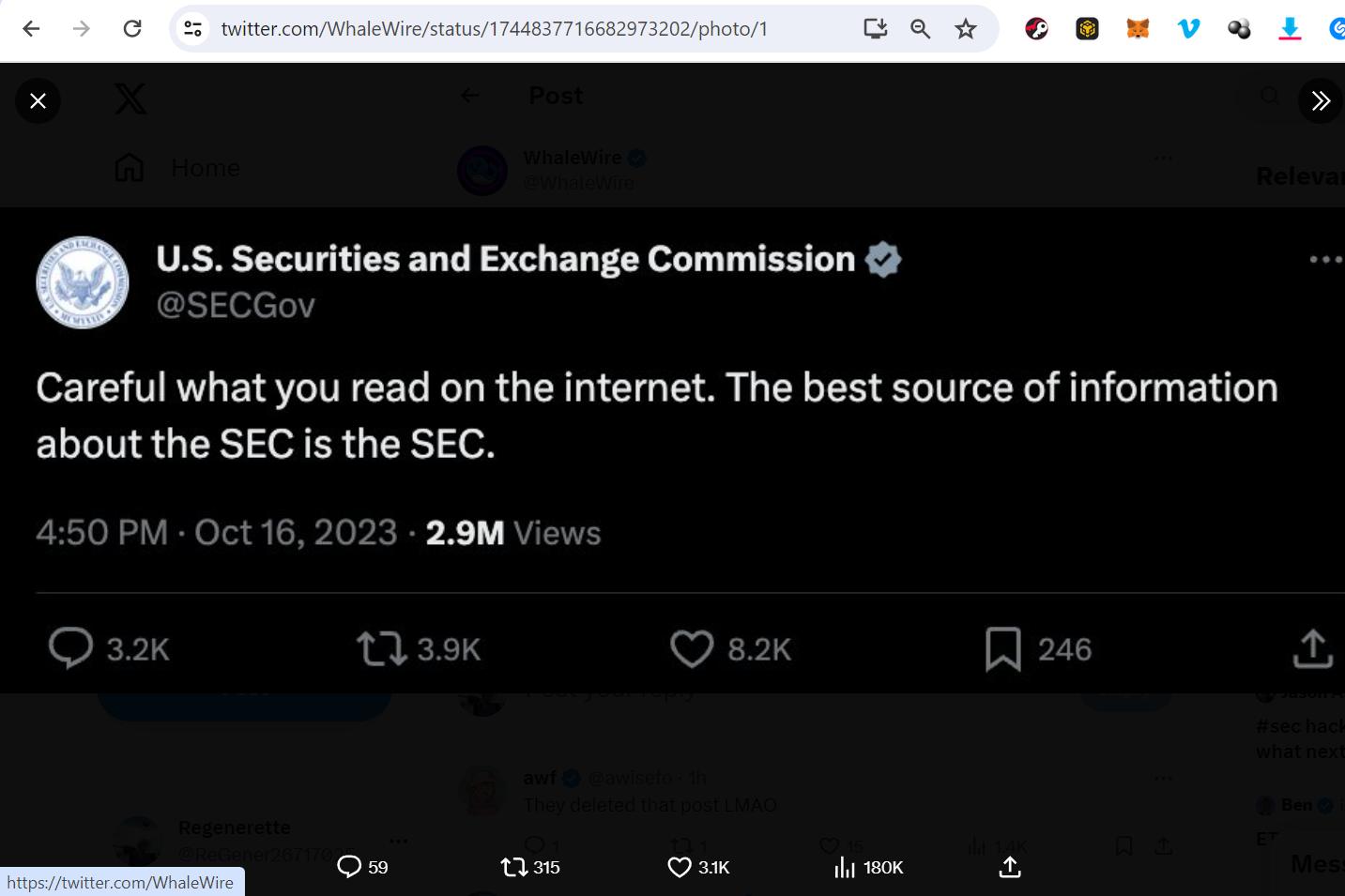SEC Twitter Feedback BOOM: Swift Recovery Sparks Investor Doubts and Calls for Accountability in Bitcoin ETF Story
Self-mokery is a concept I find as a perfect tool for highly-intelligent people. But today is about stupid irony. The U.S. Securities and Exchange Commission (SEC) took to Twitter to announce that their account had been compromised, resulting in an unauthorized post. The tweet, originating from @SECGov, stated, "X account was compromised, and an unauthorized post was posted. The SEC has not approved the listing and trading of spot bitcoin exchange-traded products." This revelation has sparked a flurry of opinions and concerns across social media platforms, with investors questioning the swift resolution of the issue and raising doubts about the SEC's ability to safeguard crucial information.
https://twitter.com/SECGov/status/1744837121406349714
People on Twitter had different reactions and I want to tell you about that because I am more than glad to see that most of them have a lucid, sharp mind and see beyond these stupid games played right in front of our eyes.
Let's Think: Swift Recovery or Suspicious Timing?
One of the first opinions circulating in response to the SEC's tweet is a mix of disbelief and frustration. The tweet questions the rapid recovery of the compromised account, expressing incredulity that the SEC could resolve a security breach so quickly. The sentiment is encapsulated in one one tweeple' statement, "YOU GOT YOUR ACCOUNT HACKED AND BACK THAT QUICK?!!!? It takes us weeks…"
This skepticism is not without merit, especially considering the gravity of the information the SEC disseminates. This kind of feedback highlights the contrasting timeframes between a regulatory body's ability to regain control of its platform and the extended periods other individuals or organizations often face in similar situations. The underlying implication is that the SEC's quick recovery may not align with the realities of cybersecurity incidents, raising eyebrows and prompting further scrutiny.
How About Fairness? Penalties and Accountability:
Another prevailing opinion revolves around the potential consequences for the SEC following the unauthorized tweet. The tweet notes, "You usually give penalties in the 100s of millions when other private investment firms make mistakes like this that manipulate the market..." This sentiment reflects a common belief that regulatory bodies should be held to the same standards they impose on private entities, especially when market manipulation is at stake.
The suggestion here is clear – if private investment firms face substantial penalties for market-related infractions, the SEC should be no exception. Investors are quick to question whether the SEC will hold itself accountable to the same standards it imposes on others, and whether the swift resolution of the Twitter incident will impact the severity of any potential consequences.
Transparency Matters:
A crucial concern raised by the tweet is the ambiguity surrounding the nature of the account compromise. I've been noticing responses under the SEC tweet like this question "Was the account actually compromised, or was a drafted tweet released prematurely by someone who had authorized access to the account?" This distinction is significant, as it draws attention to the necessity of transparency in the regulatory process.
Investors are calling for clear communication from the SEC, urging the regulatory body to divulge the details of the incident. The argument is that the investing public deserves to know whether the compromise was an external breach or an internal oversight. Clarity in such matters is paramount for maintaining trust in the regulatory process and ensuring that investors can make informed decisions based on accurate information.
Some Investor Concerns and Legal Ramifications:
The tweet reflects the broader concerns of investors who may have acted on the misinformation provided by the compromised account. Some are questioning, "How do I get my money back from the SEC? I bought Bitcoin because the SEC tweeted the ETFs were Approved then the Bitcoin price crashed?" This raises significant questions about potential legal repercussions and the responsibility the SEC bears for any financial losses incurred by investors who acted on the misleading information.
Here's another tweet reply that just makes me almost feel the sentiment of those questioning the SEC's ability to protect investors when the regulatory body seemingly struggles to safeguard its own Twitter account: "How are you supposed to protect investors when you can’t even protect your Twitter account?" This inquiry underscores the need for the SEC to reinforce its cybersecurity measures and maintain a robust system to safeguard sensitive information.
HMMM...--Calls for Accountability:
The final opinion expressed as a reply to the tweet that I want you to know about is a call for accountability, specifically targeting @GaryGensler and @SECGov. The tweet asserts " @GaryGensler & @SECGov should be held accountable for this market manipulation. #BitcoinETF." This statement reflects the frustration and anger of investors who believe that the SEC's actions, intentional or not, have led to market manipulation and financial losses.
Here it is: https://twitter.com/gandreou007/status/1744838049106632747
Soooo...
In the case of the SEC's compromised Twitter account, a multitude of opinions and concerns have been issued today, questioning the swiftness of the recovery, demanding accountability, and highlighting the need for transparency. Now, I think SEC faces the challenge of securing its digital infrastructure and also rebuilding trust with the investing public. The implications of this event extend beyond a mere cybersecurity breach. As I've seen it today, they touch on the core principles of accountability, transparency, and the SEC's role in safeguarding the integrity of financial markets.
Let's think about that.
Thank you for reading!
With respect,
Zpek
Posted using Neoxian City
